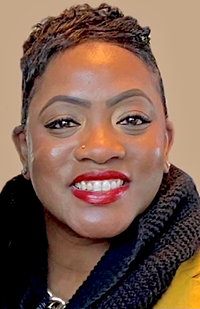Inspired by MLK, Court Member Works Toward ‘Restorative Justice’

Delaware County Assessment Center supervisor Ruchelle Pride carries on Martin Luther King Jr.'s legacy of advocacy for the underserved, both professionally and voluntarily.

Delaware County Assessment Center supervisor Ruchelle Pride carries on Martin Luther King Jr.'s legacy of advocacy for the underserved, both professionally and voluntarily.
Inspired by Martin Luther King Jr.’s devotion to social change, one court official continues to speak and act on issues that linger since the iconic activist’s rise to prominence generations ago.
“Raising awareness is important, but what we do after that is what’s most important. I’m very action-oriented, and social justice takes all of us,” said Ruchelle Pride, supervisor of the Delaware County Assessment Center,
The center is a community-based service of Delaware County Juvenile Court. Pride spoke as part of a panel discussion on how to better promote diversity, equity, and inclusion within a person’s area of influence.
The event was streamed on Martin Luther King Jr. Day in coordination with Delaware County’s MLK celebration committee and Ohio Wesleyan University.
“I came into the conversation with a different perspective and passion,” said Pride, who’s worked in the juvenile justice system for 13 years.
Pride’s position with the court is predicated on early intervention support for youth and families, and her aid to volunteer county organizations led to her inclusion as part of the community conversation.
Other panelists included representatives from the university, Delaware City Schools, and community programs that address racial and socioeconomic concerns, such as the Delaware African American Heritage Council and Second Ward Community Center.
Having extensive experience in previous roles as a detention officer, probation officer, and program manager for Franklin County Domestic Relations and Juvenile Courts, Pride has an expansive viewpoint on the impact the judicial system can have on youth and their loved ones – and how family instability can lead to a child’s contact with the courts.
The collaboration required between stakeholders and community partners in the legal system is much like the labor needed to address the layers of hardship and scrutiny that exist for so many disenfranchised people throughout society.
Many times, those entities overlap, including between the courts and law enforcement.
“Restorative practice and restorative justice go hand in hand,” Pride said. “We want to be proactive as opposed to reactive. I don’t want to have to criminalize a young person before we can help them.”
Aside from the progressive values that King instilled in millions of followers, the revered speaker’s biggest influence on Pride was his ability to put words into action by educating others.
She cited his “consistency to be persistent” in the effort to enact change, no matter the length or the difficulty of the struggle.
That holistic involvement is engrained in her work – both professional and volunteer.
With her administrative responsibilities, she implements policies, objectives, and initiatives.
Her macro outlook is paired with the micro significance of personalized contact, whether it’s community engagement, crisis intervention, conflict resolution, or assessing individualized needs and social determinants for those at risk.
Pride said her “life work of trying to be helpful and supportive to the community” is sourced in the words of Dr. King’s contemporary, Malcolm X, who declared: “I’m for truth, no matter who tells it. I’m for justice, no matter who it is for or against. I’m a human being, first and foremost, and as such I’m for whoever and whatever benefits humanity as a whole.”


